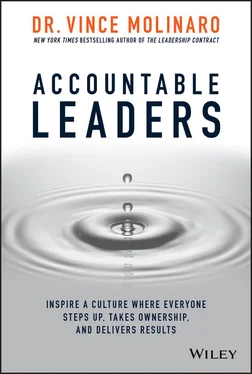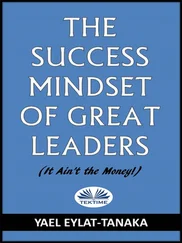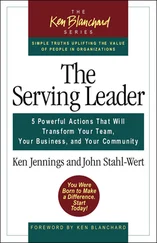In 2013, when the first edition of The Leadership Contract was released, these ideas immediately resonated in the marketplace. No matter where I went, or whom I talked to, I repeatedly heard the same thing: “This is what we’ve been missing. We need people in leadership roles to understand what it means to be a leader. They need to understand that they’ve signed up for something important, and we need them to step up and be accountable.” “They can’t simply be committed to only the technical parts of their roles; they need to fully commit to being accountable leaders.” Those who read my book described it as a mindset book about leadership because it helps leaders understand how they need to think about their roles and what they must pay attention to every single day.
I believe this idea of leadership accountability resonated because I’ve come to appreciate that as humans, we expect more of people in leadership roles. We hope that they will step up and lead, create exceptional organizations, and even make the world a better place. When they succeed, we praise them, admire them, and even want to emulate them. However, when they fail, misbehave, or are simply mediocre, we feel a sense of disappointment, despair, and even disgust.
As a leader, you need to understand that you signed a leadership contract and that it comes with four terms and conditions (see Figure I.1). Let’s explore them now.
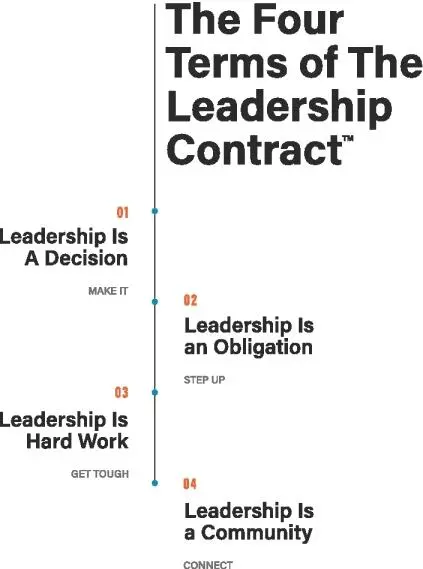
Figure I.1 The Four Terms of The Leadership Contract
1. Leadership Is a Decision
When you are in a leadership role, you must be fully committed to your role. You must be clear on the expectations of the role and be ready to set the tone for others. You will not be successful as a leader until you are fully committed because this is what the role demands. You can’t approach your leadership role lightly or be ambivalent about it. You certainly can’t opt out. You must be all in, especially in today’s world. The constant change, disruption, and complexity that leaders face today is considerable. If you aren’t prepared to lead in this environment, then you must decide that a leadership role may not be for you and have the courage to make that decision. If, however, you decide you want to be an accountable leader, then you must fully commit.
2. Leadership Is an Obligation
Once you decide to be an accountable leader, you quickly realize that you will be held to a higher standard of behavior. We expect a lot from anyone in a leadership role today. You must also recognize that you will have obligations that go beyond yourself. It’s not just about what is best for you and your career. You are obligated to your customers and employees, your organization, and the communities in which you do business. You need to create enduring value and leave things better than you found them. In this book, we will discuss your obligation to hold others accountable to be leaders, to build truly accountable teams, and to work with other leaders to establish strong leadership accountability throughout your organization.
3. Leadership Is Hard Work
Leadership isn’t for the feeble—you need resilience, resolve, and determination. You will need personal tenacity to rise above the daily pressures and lead your organization into the future. You will need confidence and courage to have tough conversations and to push through barriers to strategy execution. This term of the leadership contract demands that you get tough with yourself and do the hard work that you must do as a leader. Unfortunately, too many leaders shy away from the hard work. You can’t avoid or wimp out on it. If you do, it will weaken you, weaken your team, and impede your progress, and ultimately prevent you from delivering results.
4. Leadership Is a Community
The fourth term of the leadership contract demands that you connect with others to create a strong community of leaders in your organization. You need to work with your peers to create a leadership culture in which there is a sense of deep trust and mutual support, where you know everyone has your back, and where all leaders share the collective aspiration to be truly accountable. You will need to break down silos, work across departments and functions, and learn to bring a one-company perspective to your role. If you can, you will stand out as an invaluable leader in your organization.
The Ripple Effect—Accountability Breeds Accountability
Take some time to reflect on the four terms of the leadership contract. To what extent are you a truly accountable leader? Is your team as accountable as it can be? Does your organization have a culture that inspires others to step up and deliver results? If you are honest with yourself, like most leaders I work with, you will come to realize that there is an opportunity for you to be more accountable in your current role. That’s one lesson I learned in my own leadership roles. As accountable as I thought I may have been, if I were honest with myself, I could see more ways to step up and be even more accountable. Here’s something else I learned along the way: You can’t ask anyone else to be accountable if you are not accountable yourself. You must lead by example. Why? Because accountability breeds accountability. Let me repeat that: Accountability breeds accountability.
If you set the right tone, most everyone will follow. It’s like a ripple effect that can happen in a still pond. I’m sure you have experienced it. Once you touch the water with your finger or throw a pebble in it, you watch the ripples take form and expand throughout the entire pond. That’s how accountability works in organizations. If you step up, and others see you setting an example of accountability, you create a positive ripple effect that inspires and encourages others to also step up and be accountable.
However, a ripple effect can work the other way as well— mediocrity breeds mediocrity. When mediocrity ripples throughout an organization, then you have a problem. I believe we have too many people in leadership roles who seem to be fine with being just okay—average or mediocre at best. No human endeavor of any significance has ever been achieved with mediocrity. Extraordinary results—whether from an athlete, an artist, a surgeon, a manager, a teacher, or a CEO—are never achieved through mediocrity.
You have a choice. What will it be for you? Accountability or mediocrity? What ripple effect are you creating in your organization?
The Dual Response to Building Strong Leadership Accountability
To me, accountability is the bedrock of truly great leadership. In The Leadership Contract , I suggested that a dual response is required to make it happen in an organization (see Figure I.2). First, as a leader, you must step up and be accountable at a personal level. Second, you must then build accountability across the organization as you work with your direct reports, teams, and peers. Let’s explore these ideas in more detail.
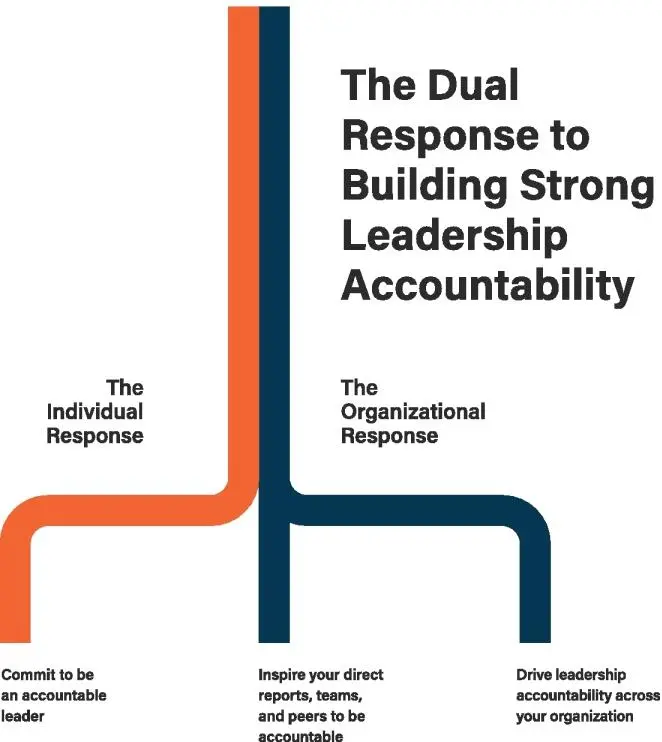
Figure I.2 The Dual Response to Build Strong Leadership Accountability
At an individual level, you must do your part to step up and lead in a more accountable manner. You need to set the tone by living the four terms of the leadership contract. You can’t go around telling others to step up if you are not doing it yourself. To drive your personal success, you may want to review the ideas and activities in my books: The Leadership Contract (3rd ed.) and The Leadership Contract Field Guide. They include many foundational resources that will help you develop the mindset necessary to become the accountable leader your organization needs you to be. You can also go to the Apple and Google App Stores to download the Accountable Leaders App. Once you download the app, you can gain access to learning resources and courses, and be part of a community of like-minded accountable leaders committed to leading to a higher standard of behavior.
Читать дальше
